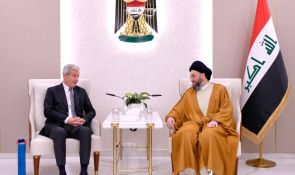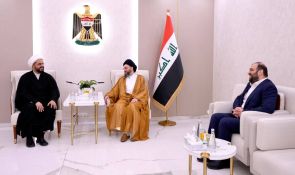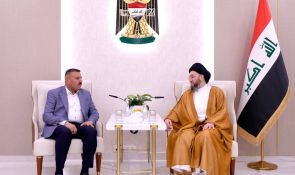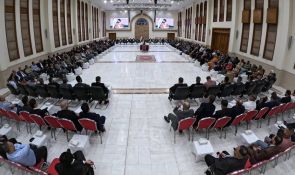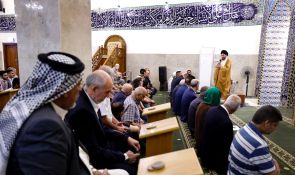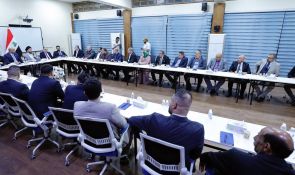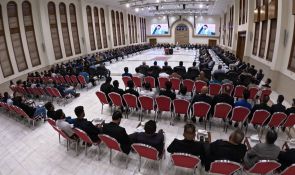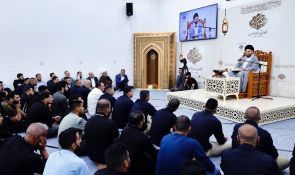SAYYID AMMAR AL-HAKIM: “Success of Baghdad’s Summit is the responsibility of the Arab brothers, not only that of the Iraqis.”
Iraq has done what it should; the Arab brothers have to bear the other portion of the responsibility to participate and attend.
Few days separate us from the Arab Summit which is supposed to be held in Baghdad in the coming days. Iraq, government and people, has carried out a national and Arab duty, transcending its harsh conditions and defying all obstacles in the way of holding this Summit. It accepted the big challenges and stood with resolve and will to achieve success for the Arab Summit in Baghdad. Now it is fully ready to receive the Arab leaders to hold this Summit in the beloved capital, Baghdad. We fully realize the extent of big pressures which the government tolerated to convince the Arab countries to hold this Summit so it will be a true opportunity for Iraq to return and assume its natural role in the joint Arab work network. Now, since Iraq, as people and government, has carried out its duty and prepared the necessary logistical, political, security and service premises to receive this Summit, the ball is in the court of the Arab brothers to bear their responsibility and respond to this Iraqi national call, to respond to this sincere Iraqi call and participate in the Baghdad Summit.
The Arab brothers must rise above some narrow and temporary calculations and to participate in the Baghdad Summit in the highest levels, an effective and distinctive participation, and to reciprocate the greeting of the citizens of Iraq with an even better one when the Iraqi people presented this greeting. If they do, it is to their credit, and if they do not, it is against them. Iraq has done what it should to prepare the atmospheres for holding this Summit.
The Arab brothers must realize that their participation in this Arab Summit in Baghdad is not an achievement for Iraq only. Rather, it is an achievement for all good Arab peoples that pass nowadays through a phase of big development on the ideological, political and national level in the shade of the Arab Spring and the big transformation the Arab region is witnessing. What is hoped from the Arab leaders is that they come, participate, sit and study this Arab concern for all their peoples and identify the best ways and means to tackle the problems and challenges that now stand in the face of our Arab world.
The Baghdad Summit does not only represent a challenge to Iraq, as a government and a nation, but it also a challenge to all the Arabs to find out by themselves if they are able to bear the responsibility or to relinquish it. The responsibility for the success of the Baghdad Summit is not a purely Iraqi one; rather, it is the responsibility of all Arab brothers. Iraq has done what it should, and the Arab brothers have to bear the other portion of the responsibility to participate and attend if they want to prove that they are convinced about the general framework of the joint Arab work, to study the Arab issues and concerns that face their countries and nations. This Summit will be dedicated to studying these concerns and problems in order to build an Arab work in a sensitive and destiny-making phase of our Arab nation, and it also emphasizes their commitment to the League of Arab States, to its institutions and to the work mechanisms through it.
Summit is Iraq’s opportunity to stand and make its statement, to clearly express its vision about the Arab, regional and international reality
The holding of the Baghdad Summit allows the Iraqis to express their viewpoint, the responsible Iraqi viewpoint towards the various issues, whether in the Arab affairs or in the big transformations which we now witness in our Arab world and Iraq’s role as well as that of the Arab countries and governments about these transformations and public demands and about the regional and international reality. It is an opportunity for Iraq to stand and make its statement, to clearly express its vision regarding the Arab, regional and international reality in the historic communiqué which will be issued and which will be called the Baghdad Declaration. When the Summit is held in any country, a communiqué is issued from that country which is regarded as an official document that expresses the hosting country’s viewpoint of the various political issues in the Arab field and the general concerns. For this reason, the Baghdad declaration document must be prepared in a solid way so it may express the depth of the Iraqi national will towards all the basic dossiers and issues from our Iraqi viewpoint towards the region, the Arab and international conditions, etc. also, the holding of the Summit in Baghdad is regarded as a precious opportunity to reconsider and develop the Charter of the League of Arab States which was coined in the year 1945. Since 1945 and till the present, big developments have taken place in the Arab, regional and international reality, in the nature and ambitions of nations, in the nature of the Arab regimes and the processes of administering the Arab countries. This document, therefore, has to be renewed and to witness development and reform so it may be harmonious with the Arab reality which we now live and to achieve the balance between the ambitions of the Arab nations on one hand and those of the Arab governments on the other. This document must contain concepts of democracy, plurality, the peaceful transformation of power, elections, the freedom of expression and the acceptance of the other, in addition to important and basic concepts which now are the center of attention of the good Arab nations, and they now have a practical value in the joint Arab work. The Baghdad Summit represents a golden opportunity for the assembled Arab leaders to put a unified program for political reform in the good Arab countries.
Arab leaders must coin a joint political reform program
We need this joint reform program which the Arab leaders will put together and act upon in all Arab countries. The absence of a political reform program in the Arab countries is the one that put us before the harsh reality which we live in our Arab country whenever we see Arab countries joining a line to change the regimes of other Arab countries without the existence of restrictions and principles that regulate such an action and such paths, especially since we have monitored during the past decade seven reform projects submitted by seven countries without any of them being implemented in order to achieve real reform in the Arab political reality. Therefore, the Baghdad Summit is a true opportunity not only for Iraq but for all Arab countries to sit and adopt the right solutions so this Summit may represent a basic shift in the joint Arab work.
One of the most important reform lines in the League of Arab States is paying attention to the Arab civil society and to focus on the big Arab blocs in our societies so the League of Arab States may be in a direct link with these big blocs, the big human congregations, which represent the will of genuinely Arab masses. This is in total harmony with the message of the League of Arab States: It is a League for the Arab States and not only for the Arab governments, and it must open up to these civilian blocs and congregations in our Arab societies.
The Kuwait Visit: A Step in the Right Direction
From the Arab Summit to the regional relations, the visit by the head of the council of ministers of the sisterly State of Kuwait has represented an important step in the right direction. We do not expect swift solutions that resolve the outstanding issues between both countries in a visit or two. Such problems and issues need communication and exchanged visits so the solutions and suitable treatments may be put in place. But what is important about this visit is that it came on the principle of total elimination of the crises and problems in our Arab reality. It is an important principle which we always back, support and encourage, and it must form a foundation in our regional relations. How do we eliminate the crises, resolve the problems and put joint issues on the table of dialogue in order to find the exits that ensure the interests of our Iraqi people and ensure the interests of the other peoples? We call on the sisterly State of Kuwait to reciprocate this visit with one on the highest levels. Thus, through these visits and communication among the officials, we can look for solutions and treatments for all outstanding issues between both countries.
The exchange of ideas, the frank, clear and constructive discussion of the outstanding issues, represent the sound prelude for resolving the most complex problems in our Iraqi reality with all respected countries in the region and the world, and we must employ this principle as the basis in our dealings.
We have to bypass the painful past which we lived the victims of which were both brotherly peoples, the Iraqi and the Kuwaiti, alike. We do not bear the responsibility of the mistakes committed by the past regimes which sought to harm the citizens of the Iraqi people before that of the other peoples, and we have to turn a new page of relations based on the principles of common interests, love, affinity, Arab and Islamic brotherhood. We also hope that the Iraqi government will employ this important principle, the principle of eliminating all crises and problems with all neighboring countries and with the region and to regard it as a sustained strategy which we do not relinquish. Whenever a problem takes place, we go to its essence and treat it because this is the sound prelude and way to resolve the problems. We must distance ourselves from anything that taint the clarity of the relationship between Iraq and other countries. We must enter in the essence of the true problems and activate the specialized committees to come up with results that ensure Iraq’s interests and those of the other countries just as we advocate eliminating crises in regional relations.
Eliminating domestic crises
We also call persistently for eliminating the crises in our domestic and national problems. We must put solutions for these problems that stand in our face in the Iraqi reality. We monitor with extreme concern the escalation expressed by more than one side in our Iraqi reality, and we worry that Iraq may move from the phase of political crisis to one of the political complex. Complications which may affect the political process could paralyze the movement and place the sides in a status of continuous political clash with each other, and the citizen is the one that pays the price of all these tensions and convulsions in the Iraqi political reality.
Lead us to an option other than dialogue to solve problems?!
When we call for the dialogue table, I sometimes am confronted by those who lack discretion and political wisdom who grumble and take the principle of dialogue lightly. I say to them: Lead us, good folks, to another way to solve our Iraqi problems other than dialogue, any way that we adopt, any path that we undertake. If you have another viable way, lead us to it, guide us towards it so we may together go on to solve these problems in a way other than the dialogue method, for we are fully ready to provide all we can to solve these problems through any successful way. We say that the dialogue is the way; so, if you suggest another way, lead us to it, may Allah have mercy on you, and we will go on with that other solution.
Is the media exchanging of accusations via satellite networks is the way to solve problems, or do the tense statements made by several sides in our Iraqi arena provide the solutions for our problems? Or does the policy of doing all what any side wishes and commends relieves each of us of the responsibility to work independently of the other side, as it works as it pleases provide the solution for the problems? How do we treat these problems and tensions if we do not employ true and constructive dialogue to sit at one table and solve our problems?
We are in the same boat. Anyone who thinks that he is free in his own portion of the boat to behave as he pleases is wrong. The largest boat needs one hole to drown. Wherever the hole may be, all the boat will sink. So, this fact cannot be portioned. We are citizens of one country, and we cannot be saved except when everyone is saved. We cannot succeed except when everyone succeeds. And we cannot achieve victory except when everyone is victorious. There is no other way to solve these problems. We will turn and wrestle on the screens of satellite news channels here and there, and we will charge and betray others and exchange taunts with each other here and there. Some Iraqi politicians will condemn each other, and each of us will shelter himself behind his sect, ethnic group and religion, then we come after that and find out that there is no way to solve and to treat other than sitting at the table of dialogue and put matters in a frank and transparent way and to put dots on the letters, solve the problem and come to an understanding. If this is the end, why should it not be the beginning? Why should we not start with the dialogue without taunts and condemnations, without making charges and calling others traitors, without abusing this or that, without dragging the street to sectarian or ethnic feuds? Let us go directly to dialogue and solve the problems in the circle of political dialogue and thus cross to the other side. Thus will we save all Iraqis, and the Iraqi citizen will sense the prosperity, calm and stability. He will sense the presence of officials who put themselves at his service. Our presence in this homeland is our choice, our destiny, and we are happy with this destiny; therefore, we must cooperate based on the principle of coexistence, of realizing the facts, of serious dialogue that provides solutions for all these problems and obstacles.
Be informed, respectful politicians, that history does not show mercy, and it will haunt each and everyone of us if he does not bear the right responsibility and if he does not undertake the steps that can minimize the intensity of the struggle and allay the situations so there will be closeness, love and affection among all Iraqis. We, therefore, called for eliminating the crises, that we must sit at one table and solve our problems so that the Iraqis may feel that they placed their trust in sincere forces that are keen about their interests, that they enjoy a measure of responsibility during tough times. This political rope pulling which makes no sense and for which there is no concept, and it increases in nothing but psychological pressure on the citizens, must come to an end through this calm and constructive dialogue.
The Sha’ban Intifada is the jewel in the crown of the history of our struggle and that of the great Iraq
Nowadays, we bring to memory the anniversary of the Halabja massacre and that of the Sha’ban Intifada which coincided with March of 1991. What a connection between both of these major events, and what connotations we can obtain from this link! Do the martyrs of Halabja and those of the mass graves, which claimed hundreds of thousands of lives during a short period of time in the Sha’ban Intifada, not deserve that we must transcend some narrow issues that concern us here and there and release a clear message to those martyrs that their sacrifices were not in vain, that they sacrificed for the freedom of Iraq, and we now sacrifice in order to build Iraq? This must be our message for those heroic martyrs. The Sha’ban Intifada is the jewel of the crown in the history of our struggle and of that of the great Iraqi struggle for which we sacrificed many. Yet this Intifada shall remain lit, shell remain to be a leader and a resounding message for all coming generations in our homeland when such a large number of our citizens sacrificed themselves, O loved ones!
Those who participated in the Sha’ban Intifada released a reverberating message to the whole world, forcing superpowers to go back and apologize, to surrender to the will of the Iraqis and to correct their stances which they adopted during the time of the Intifada, when they empowered the [Saddami] regime, helping it suppress the citizens of our Iraqi people.
This Intifada released an important message to the world that there was no political opposition in Iraq to a standing regime but a sweeping popular revolution against an oppressive dictator. This revolution changed the paths from a peaceful opposition to the regime’s mistakes to reveal the true picture of the size of injustice and despotism practiced during the buried regime.
Those who participated in the Intifada were able to plant the seeds of the Arab Spring the flowers of which opened 21 years after that Intifada. Yes, the maturing of these seeds was delayed: They opened up two decades later because they were buried under the frost of dictatorships, the malice of the double-standard policy and under the contemptible sectarianism in many sites.
O heroes of the Sha’ban Intifada! May Allah reward your great and magnanimous sacrifices. History, in which facts are forged, has wronged you, and the deviated policy wronged you, the one that facilitated killing you and oppressing you. But nothing proves to be right except what is right. The reality surfaced though after a while. Now, even till this moment, you are yet to be dealt with fairly: Everyone talks in the name of the Intifada, everyone receives positions in the name of the Intifada, but many of the honest heroes of the Intifada are yet to get their rights and natural opportunity. The men and women of the glorious Sha’ban Intifada represented a shining point in Iraq’s history. They carried the wounds of their homeland in their chests, taking them to the broad and spacious parts of the world. Some of them embraced martyrdom, while others made themselves ambassadors for the Intifada roaming the continents of the world wherever there were participants in the Intifada in all parts of the world, spreading the glad tidings and talking about these great and big sacrifices of the citizens of our people.
O sons and heroes of the Sha’ban Intifada! Document the history of your people and homeland fully well, and make these great sacrifices shiny, clear, in Iraq’s history and features. O loved ones! You carried the homeland as a name and a meaning, and you carried the big responsibility towards this wounded homeland. You offered sacrifices on the altar of the tortured homeland. Congratulations to you, loyal heroes, and there must be endeavor so you may receive their natural entitlements.
The Rafhaa Camp for Iraqi Refugees shall remain a landmark in the history of our citizens, and Rafhaa shall remain inscribed in the conscience of the great injustice done to our citizens. This link between Halabja and the Sha’ban Intifada and the mass graves represents the destiny that unites us in the Jihad, in the struggle, in the common destiny. The martyrs of the mass graves were untied as they were in their graves. They were not divided by sects, religions or ethnicities. We find the Arab, the Kurd, the Turkman, the Shi’i, the Sunni, the Muslim and the non-Muslim in united cemeteries as pointed out by the excavations of these graves and the identifying of those pure bodies. But their message is one and the same: Tyrants depart, and the people remain steadfast; Iraq remains, the people of Iraq remain, while the tyrants go to their ill fate.
Terrorism tries to fish in disturbed political water; whenever the political water is disturbed, terrorism finds a gap and a foothold
A new batch of martyrs and the wounded fell at the hands of the blind terrorism, and the souls of the martyrs rose to the heavens to complain to Allah Almighty about this buried animosity of these terrorists whenever they harm our countrymen in this heinous way so more than 250 martyrs and wounded persons would fall on a single day in several governorates of our homeland. Terrorism tries to fish in the disturbed political water. Whenever the political water is disturbed, terrorism finds a gap and a foothold to enter it and to abuse Iraq and the people of Iraq and deal these painful blows to our citizens. Terrorism is a virus that lives in the polluted environment; therefore, we say to all our political brothers: Purify your waters so terrorism may die on its own. This is one of the political venues for battling terrorism.
Harmony, concord and understanding among the politicians will cause the terrorists to miss the chance to harm our citizens. We say this to our sons in the security services: We thank and appreciate your big efforts in defending this people and in pursuing the remnants of terrorism. But we expect you to strike with an iron fist on these terrorist groups and to support our countrymen. We are fed-up as we find these body parts of our dear ones, the best of our people, falling on roadsides every day. We expect the security services to deal painful preemptive blows while realizing that the security solution is not by itself enough to deal with this phenomenon.
Terrorism tries to mix the cards more than they now are mixed, and to send multiple messages pointing out in them that it holds the reins of the initiative and of action, that Iraq is out of control. It thus tries to scare the Arab rulers so they may not participate in the Baghdad Summit. It also tries to prevent the Iraqis from sitting at the table of dialogue and solve their problems. For this reason, we hope that our battle with the terrorists is about to come to an end.
The terrorists’ sadism in killing our citizens will never be able to stop the march of this nation and its right to live. Resolve and insistence on going on to live, build and progress forward is the resolve tht we see in the Iraqi citizens in general. If the goal behind these terrorist operations is to send a message to the Arab rulers that they should not come, we say to our brothers from among these rulers: Your surrender to these messages will encourage these terrorists. Terrorism is blind. Every day it expands its fields of movement, its terrorism, its abuse of people. It started striking in more than one Arab country as we monitor in the past week. Your attendance of the Summit will help eliminate terrorism and stand in its face because our issue is one, and nobody is now an exception to the targets of the terrorists, of these groups that work in the dark. I also say this to our political brothers in this homeland: What happens proves the soundness and credibility of our viewpoint which we have already presented, that is, the solution starts with us: If we can solve our problems, the solutions for the other problems will come one after the other. Terrorism fishes in the disturbed political water; therefore, we have to stand in its place by purifying our political waters. We must love each other, for this is nearer to bringing about the mercy of Allah, the most Praised One, the most Exalted, and is nearer to winning the respect of the Iraqi people for those who bear their responsibilities, and it is nearer for history to be fair to us.
Departure of Pope Shenoda
We send our condolences to the Orthodox Coptic Church in Egypt and the Arab world on the occasion of the departure of Pope Shenoda III, Pope of Alexandria, who was a religious symbol not only for Egypt but for the entire Arab world. The man we have lost distinguished himself with the expanse of his education, the beauty of his manners, with his patriotic feeling, with his affiliation with the East, with the Arabs. What we find in this good personality is the intellectual openness which is conjoined with the identity, originality and the belonging to this good nation. On the Church level, he represented the Eastern Church in the historic, religious and cultural symbolism it carries in our Arab world as well as on the national level. He represented moderation and the middle grounds. All this manifested itself in the openness of Pope Shenoda to Islam as a culture and a civilization and on the Muslims as brotherhood and friendship. In his patriotic and national stances, and in his interaction with the nation’s issues, he was one of its sons and a partner in the march and in the destiny. Pope Shenoda was the safety valve for safeguarding the national unity in Egypt and for firming the national and ethnic affiliation for the Coptic Church, for the Copts of Egypt as a whole. He was a formidable bulwark before attempts of foreign interference to drag this Church and its followers to paths that tear up the social fabric in Egypt. He adopted big stances. We, therefore, send our condolences to the respectful Christian community and to the followers of this respectful personality on his death, hoping that one who is competent for this post will fill it and will continue his work.
Nowruz: a celebration stop
The twenty-first of March is a station where some Iraqi citizens, the people in Kurdistan, celebrate the Nowruz Feast, and so do 300 million people in the world. They celebrate the feast of spring, of nature. We say to all these what was said by the Commander of the Faithful, Imam Ali, peace with him, when sweets were presented to him: He said, “What are these sweets for?” They said to him, “Master! Today is the Nowruz Day, and these sweets are for this Nowruz occasion.” He said, “If sweets are offered in the Nowruz, we must then celebrate Nowruz every day!” This interesting anecdote is narrated by history about Imam Ali (peace with him). We, too, wish the residents of Kurdistan and all good nations that celebrate this feast that they celebrate Nowruz every day so long as merry occasions and festivities stand.
We thank, appreciate and express our pride in the sons of Kurdistan for the good way in which they welcomed us, for the generosity of their hospitality and the big sentiments with which we were met during our visit. We have no choice is to go, communicate, explain and love each other, for we are sons of one and the same homeland, and we must get closer to each other.


